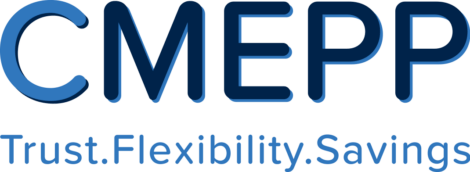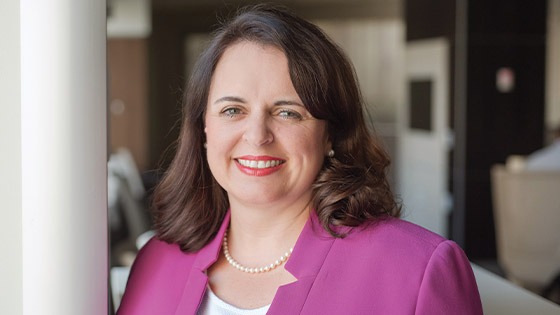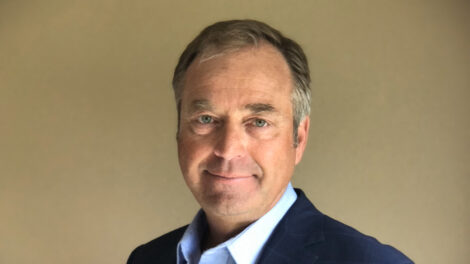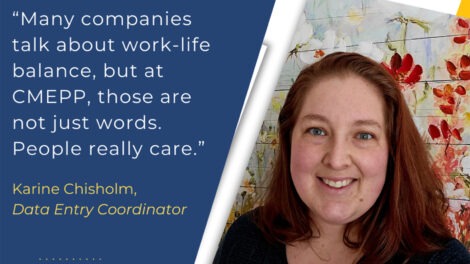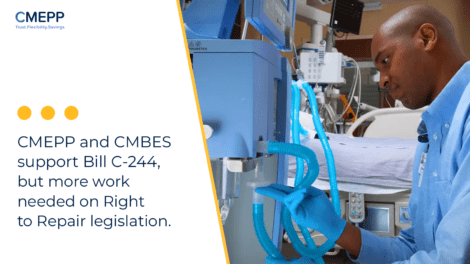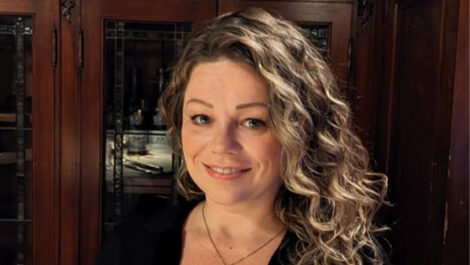Tammy Quigley: ‘For me, it always starts with the why’
Within weeks of joining Shared Services West, Tammy Quigley found herself in the middle of the supply chain crisis that erupted early in the pandemic. Fortunately, she had incident management and communications training – skills that helped her then and continue to guide her actions in her new role as System Innovation and Business Development Executive at London Health Sciences Centre (LHSC).
Tammy, who is also a member of the CMEPP Board, knows that difficult decisions are part of being in healthcare, but says those decisions must be guided by transparency, trust-building, and communication.
Congratulations Tammy on your move to London Health Sciences Centre (LHSC) six months ago. You worked at LHSC between 2017-2020 before going to Shared Services West. How does it feel to be back?
I’ve spent my entire career in hospitals and recently spent nearly three years adjacent to hospitals. For me, it was a little bit of coming home and it was important to be in the place where patients are taken care of – I can ride the elevator with the newborn baby, help people find their way, and meet with both patients and those who care for them directly in person. Those little pieces bring joy to my day. I truly can’t picture myself being anywhere else.
There is also a new leadership structure at LHSC, headed by a CEO who I formerly worked with, Jackie Schleifer Taylor. Working for someone whose values and beliefs align with yours is something that is non-negotiable for me. She’s incredibly smart, a genuine human being and I’ve learned so much from her in terms of leadership. In fact, she’s the person who originally hired me the first time I worked here!
Are you from London?
I’m not from London, although I worked there for three years previously. I have four children and elderly parents who live in Cambridge, which is where I live. It’s about a 65-minute commute which I don’t mind.
I work from home occasionally, but presence is really important to me. I’m an extrovert so I like to be with people. I don’t like to sit on Zoom or Teams all day. I love being with people and am enjoying being back in an in-person environment.
How did you maintain connection with your teams when you were meeting virtually?
When I was running virtual meetings with my team – and I continue to do it in-person – I start every meeting by saying, “Tell me about one good thing.” It’s always the first thing on the agenda. There’s been incredible research into the practice of gratitude, particularly in the healthcare field. Bryan Sexton from Duke released a study where they were able to demonstrate that writing down three good things before you go to bed every night has incredible results, almost equivalent to the use of antidepressant medication.
I saw Bryan speak at a conference several years ago and that was a nugget that I took away. While we don’t have time for everyone to talk about three good things, we always talk about one good thing. It can be about work, it can be about home. Some people just say, “Gosh, I had the best coffee ever this morning.”
You were at Shared Services West from the beginning of the pandemic. What did you take away from that experience?
I started at Shared Services West on January 9, 2020. On Sunday, January 24 the first case of Covid was declared at 10:00 am. By Monday evening, all our hospitals had nothing that covered your face on any shelf, anywhere. Gone. Everyone thinks of March as the start of the pandemic but for us, it was January 25. It was absolute chaos.
What I would say is that I think I was in the place I needed to be, thankfully, because I’d actually chaired the pandemic planning committee in Waterloo region for two years in 2007.
I understood the things that needed to happen even though I couldn’t make them happen. I couldn’t make masks show up. But I understood how to run an emergency. I’d been trained in incident management systems. I knew how to run that cadence and what needed to happen from a communications perspective. Immediate daily calls, immediate daily data.
The benefit for me, particularly as someone new to the organization, was I got to know everybody quickly – from my own staff to all kinds of people at the hospitals we supported, right up to the CEOs. Who cared about supply chain before then? All of a sudden, all eyes are on supply chain. Which was great because it allowed our people to shine.
In your biography, I found it interesting that you’ve got a Master’s in Communication. How have knowledge and education about communications affected the way you work as a leader?
I’ve done risk management for many years. At the root of almost every problem is communication. The reason I did that Master’s degree, was because, I really wanted to get back into academia. I missed going to school. I looked at three options: accounting, because I love numbers. I looked at HR, because it’s an interesting field, something that could travel across different industries. Then I looked at communications, which is really where my passion is.
As leaders, we really need to understand strategic communications. You don’t necessarily have to do a degree in it to do that, but I did a whole course on crisis communications. Oftentimes, people will say to me, “Well, we don’t really have anything to share.” And I’ll say, “It doesn’t matter. We’re going to get in front of people and say this is what we know and this is what we don’t know. We’re going to show them our faces.”
Over the course of your career, being a healthcare executive and a board member, you’ve had to make some unpopular decisions. What have you learned about convincing people to do something when it’s an unpopular thing and that you’re not always going to be the person who is going to make things easy for people?
For me, it always starts with the why. This has to happen even before the decision gets made in terms of who are you engaging in the decision-making. When I got to SSW, there was a plan to restructure. We engaged all the frontline staff in the process, asking them, “What do you think? Tell me what the problems are.” We also committed to a post-evaluation process, where you go back after six months for even more feedback.
People aren’t necessarily used to that level of transparency, but you have to build engagement from the front. It doesn’t mean that everyone is going to be happy, but they’re part of the process. They understand the rationale. For me, it’s around transparency, trust building, and communication.
Tammy, I know that being a board member is clearly something you believe in. Why is this involvement an important part of your life and why do you support the mission of CMEPP?
Truth is, I think I stumbled into the position. When I joined Shared Services West in early January of 2020, the person I replaced had formerly been on the CMEPP board, so I took his place. I have governance experience as an executive leader and I’d also sat on a number of other boards, including a Community Care Access Centre and a nurse practitioner-led clinic.
I enjoy the governance work and being on the CMEPP board presents an opportunity to network with folks across the country. CMEPP has been great in terms of investing in our personal development – doing the ICD (Institute of Corporate Directors) courses is a huge perk for me. In healthcare we’re used to being so insular. We don’t step outside our lines very often and so it’s really nice to sit in a room with people from so many different industries and learn together.
I truly believe in the mission of CMEPP. This work was born out of a model similar to HIROC, which is a reciprocal model and has the benefit of organizations in a like-minded sector coming together to share risk and reduce their costs. It’s about providing a service that benefits us across the country.
In your experience with Shared Services West and now with LHSC, have you been able to see CMEPP’s impact in action within those organizations?
Absolutely. From a savings and efficiency standpoint, we saw that through the work we did at SSW across a number of hospitals. Hospitals are very risk-averse. So, it can be challenging to say, do you want to try something different? But I feel like with CMEPP we’re really achieving that critical mass by being in 50% of hospitals in Ontario. That’s significant in terms of becoming that trusted provider.
Every year I’ve worked in healthcare, there’s been a budget “crisis” and that became even more acute during the pandemic with the human resources crisis. But that has created an even stronger business case to move to the CMEPP model, where there’s the potential for more efficiency and more value in the relationship.
Where do you go Tammy when you need an energy or a creative boost?
I go to the water to kayak. It’s my place of rejuvenation, a place to sit and think. I took up kayaking probably about four or five years ago. I’m from Newfoundland so I love to be near water. For the past couple of years, I’ve upped my level of skill. In fact, this past summer I got my Paddle Canada Level One certification and that has helped me feel more confident on the water.
I experienced a frightening incident a couple of years ago, which is what prompted me to do this course. I was going down the river on my own and thankfully there were lots of other people around when I came across some significant rapids. The rain had been really heavy and the water was much faster than it normally was. I flipped on a rock and tipped over, lost my paddle, got dragged over the rocks. It could have gone very badly. Thankfully, there was help to the rescue. It wasn’t just me, it was happening to everybody. So that prompted me to take my certification.
What are some words of advice you would give someone just starting out in their career?
I always tell people to form your network in any way you can. Get on LinkedIn, get out in person. When someone says, you should call so and so, call them. And never hesitate to reach out to a senior leader. There’s this assumption that the CEO is never going to have time for 22-year-old me. Let me tell you, as a senior leader, I love having conversations with those younger employees or students, and they bring joy to my day. I welcome them. I always make time for new and emerging leaders to come and sit in my office and chat for a while.
I also always say, get on a board. You’re not only learning about governance, but you experience the networking that comes along with sitting on a volunteer board. It’s a great experience. I’ve sat on boards since my twenties and I think it has been really helpful in terms of my own career path.
